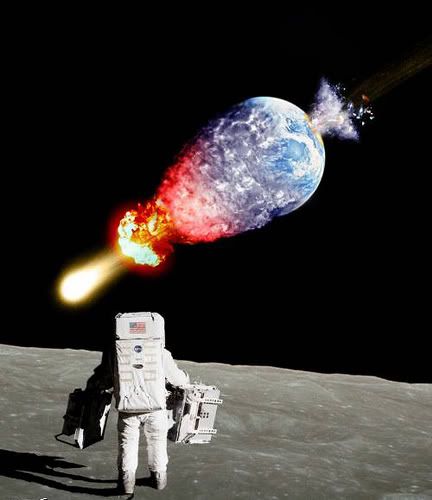When truth is no longer popular,
denial fashionable and even desired,
facades venerated and exalted above essence,
then you may lose your Self
becoming 'cool'
an ending before the next beginning
by
Shen Orion

Usually when we talk of power, we are referring to an ongoing source of power, something that is able to generate power, such as an electric generator. In a similar manner, when we speak of an energetic person, we usually mean a vigorous person, someone who possesses enormous energy. When we are around such a person, we feel there is a bank of energy happening. That person works so hard that we feel guilty being idle around him or her. We feel that we should do something too, and we begin to work very hard. Then no one can say that we have been bad boys and girls, that we haven't done out chores, washed the dishes or ironed the sheets. Because we feel that person's enormous energy, we begin to perk up, and we stop being idle. We begin to take part in the energy.
Then there is another kind of energy, which is self-existing. Self-existing energy is not dependent on something or somebody else; it simply takes place continuously. Although the source of such energy is difficult to track down, it is universal and all-pervasive. It happens by itself, naturally. It is based on enthusiasm as well as freedom: enthusiasm in the sense that we trust what we are doing, and freedom in the sense that we are completely certain that we are not going to be imprisoned by our own energy, but instead, freed constantly. In other words, we realize that such energy does come up by itself, and that we can work with it. This self-existing energy is the potentiality of siddhi, a Sanskrit word that refers to the ability to use the existing energies of the universe in a very special and appropriate way.
Self-existing energy is difficult to describe in words and concepts. When we try to describe this pattern of energy, we are only fingerpainting. Basically, it is the energy of the psychological realm. No matter what state of mind we are in, we experience a particular quality of life, that is, we experience an emotion. We begin to feel an electric spark taking place. That energy can come out of having a quarrel with our wife or not having a severe accident or a love affair. It comes out of being either rejected or accepted.
This energy is created both when we fail to do something and when we accomplish something. Rejection of acceptance by the world does not mean that the energy is either invalid or valid. Rather, there is transparent energy happening all the time. Whether we are in appropriate situation, in accordance with the laws of the universe, or we are in an inappropriate situation, not in accordance with the laws of the universe, energy is constantly taking place. This energy, from the vajrayana or tantric point of view, is simply the energy that exists. It does not mean being hard-working or extremely industrious, always doing things, being a busy-body, or anything like that. This energy can come from all kinds of challenges, in the positive or negative sense. Such energy takes place constantly.
Self-existing energy permeates all our emotional relationships: our emotions towards our relatives, our lovers, our friends, and our enemies. It also permeates our philosophical beliefs: either something is happening "right" according to our beliefs, or something has gone "wrong" according to our beliefs. Some situations try to dislodge us from our philosophical or religious commitments, and some situations try to draw us into certain commitments. All kinds of energies take place. So when we talk about energy, we are not talking about vigor alone but about that which exists in our lives. It is as though flint and steel were rubbing against each other and sparking constantly, again and again. That is, the phenomenal world exists, and we either rub against it or with it, and that rubbing is constantly creating a spark.
According to the tantric understanding of reality, energy is related to the experience of duality, the experience that you exist and others exist. Of course, both those concepts are false, but who cares about that?---at the time, anyway. The deceptive existence of you and other rubs together, nevertheless. Sometimes you are conquering the world and sometimes the world is conquering you. It is like riding on a balloon in the ocean: sometimes the balloon rides on you and you are underneath the ocean; sometimes you ride on the balloon and the balloon is underneath the ocean. That play of duality takes place constantly; that kind of electricity takes place all the time.
At this point the question arises of how can we handle, or utilize, such energy. In fact, that has been a question for a long, long time. For 2,500 years the same question has been asked: how can we handle self-existing energy; how can we work with it? Fundamentally, that question is the question of how to handle duality, or the basic split.
The split between self and other is taking place constantly, constantly creating energy, and we are always trying to work with it. Our approach is usually to try to unify the split in order to avoid the energy. We may say, "I am a good man; I am a bad man; I am Joe; I am Mary." In doing so, we are trying to bring self and other together in a superficial sense, as if no energy existed at all, as though everything were going smoothly: "There is nothing to worry about, everything's going to be okay. I am Mary, and that's smooth. There is no gap between I and am and Mary at all." Or we try to avoid the split by refusing to say "I am." Instead we might say, "My name is Mary." Still we have a problem. That approach of smothering things out and trying to make everything presentable and respectable brings enormous problems, enormous questions. In fact, instead of getting rid of the energy, it raises further energy.
The attempt to define who we are and who we are not is basically split into two approaches: the theistic approach and the nontheistic approach. In the nontheistic approach we simply acknowledge the dualistic gap rather than trying to unify it or conceal it. In the theistic approach, there is an ongoing attempt to conceal that gap completely. There is a notion of spiritual democracy. In fact, that approach is often used in dealing with political and social problems: "Blacks are not against whites--we are all the same species. Since we all live on the same earth, we should regard ourselves as a brotherhood."
That approach of covering up separateness, pretending that the black man is a white man, is the cause of all kinds of problems; but the theistic approach can go much further than that, to the point of covering up any differences: "Let us have real unity. We can conceal this problem. We can iron it out completely, like a cloth. Let us work in such a way that when we have ironed our sheet we can even conceal the seams. In fact, we can make the whole sheet seem to be made out of one big cloth...."
Another way to convey the gap is to try to eliminate discomfort. The modern world has provided us with all sorts of conveniences: television, beautiful parents, lots of toys to play with, automobiles, and so on. There are notices everywhere offering entertainment and telling us how to handle ourselves. Even while we are flying in an airplane, we have food to entertain us. The world has provided all kinds of entertainment to make us feel better, to make sure that we do not feel bad or lomely. When we board an airplane, the stewardess says, "Welcome, ladies and gentlemen. I hope you have a comfortable flight. Call us if you need any help." That is a theistic remark, and such remarks occur all the time.
On the other hand, we could act without any guidelines. This possibility may be completely unappealing to people who are used to their luxury. Nevertheless, it is a very truthful way to relate with things, and there is no room for deception. In this approach there is no hospitality: we have to provide our own hospitality. We have to work on ourselves. We are provided with kits, K-rations, booklets, and our own parachutes, and off we go. If we land on the top of a tree, we try to make the best of it; if we land in a gorge, we try to make the best of it. That is the nontheistic lifestyle: we can't do everything for one another. We have to make do for ourselves. We have to learn to be with nature. So the nontheistic tradition is much harsher than the theistic tradition. It is very skeptical, unyielding, and somewhat outrageous.
We are not comparing Eastern and Western philosophies here, but theistic and nontheistic traditions, wherever they occur. We might hypothesize that Easterners think in a different way than Westerners, and that Easterners philosophy expresses this different style of thought. But philosophy is not that neatly divided into East and West. The basic thinking processes of the East and the West are the same. The only difference that exists is between the thinking style of the ego and nonego. Failing to acknowledge that difference in style becomes a tremendous problem.
Journey Without Goal
by
Chögyam Trungpa

Images linked
Art 1,2
Programming by DPC